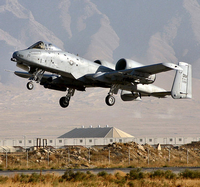Who shall we bomb next? Pundits and commentators have begun to fall over themselves declaring the necessity of launching military campaigns against Syria and Iran -- the former to prevent a humanitarian disaster and the latter to forestall the development of a nuclear weapon. The catalyst for this enthusiasm is the success of NATO’s aerial campaign in Libya, a war that apparently vindicated the long-standing promise of advanced, precision-guided airpower to cheaply and easily solve inconvenient political problems. Unfortunately, the rediscovered enthusiasm for intervention demonstrates only that the foreign policy punditocracy is committed to serially mislearning the lessons of airpower in war.
Steven Cook argues that the United States and NATO ought to start seriously discussing intervention in Syria. If not and Syrian President Bashar al-Assad is left to massacre his political opponents, he wonders, what message will it send to the international community about the right to protect? Anne-Marie Slaughter reluctantly concurs, suggesting that Western military power could ensure the security of safe harbors and corridors for Syrian civilians.
Notwithstanding many well-meaning arguments to the contrary, the final goal of any potential military intervention in Syria -- which will necessarily be conducted primarily with airpower -- will be the toppling of the Assad regime. Slaughter, for example, insists that military force should not be used with the express intent of overthrowing the Assad government. Instead, Western aircraft will bomb Syrian airfields, shoot down Syrian aircraft, blow up Syrian tanks, destroy the Syrian air defense network, disable Syrian command and communications installations, and generally deprive the Syrian government of control over whatever parts of its territory the international community deems Assad unfit to govern. We would agree to the illusion, I suppose, that this is not regime change until Assad actually falls, after which we would congratulate ourselves on another successful intervention.

